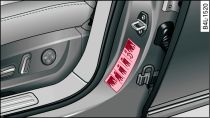
- Fig. 1 Open driver's door (LHD vehicle): Sticker listing tyre pressures
Correct inflation pressures and sensible driving habits will increase the service life of your tyres.
Check the tyre pressures at least once a month and, in addition, before starting a long journey.
The tyre pressures should only be checked when the tyres are cold. The slightly raised pressures of warm tyres must not be reduced.
The pressures must be altered to suit major changes in the load being carried.
On vehicles with tyre pressure monitoring display* or tyre pressure monitoring system* store the new tyre pressures on the MMI Link or Link.
Avoid fast cornering and hard acceleration.
Inspect the tyres for irregular wear from time to time.
Tyre pressure
The tyre inflation pressures are listed on a sticker on the face of the driver's door pillar Fig. 1. Under-inflation or over-inflation will reduce the life of the tyres considerably and also impair the car's handling.
The tyre pressure must be adjusted according to the load the vehicle is carrying. We recommend adhering to the tyre pressure specifications for a maximum load.
However, if you prefer an extra-smooth ride and the vehicle is not fully loaded, you can select the tyre pressure for a normal load (no more than three people travelling in the vehicle). Should you wish to drive with a full load, you must increase the tyre pressure to the specified maximum.
Correct inflation pressures are very important, especially at high speeds.
Do not forget the spare wheel* when checking the tyre pressures. Keep the spare tyre inflated to the highest pressure required for the road wheels.
Driving habits
Fast cornering, heavy acceleration and hard braking (squealing tyres) all increase tyre wear.
Wheel balancing
The wheels on new vehicles are balanced. However, various factors encountered in normal driving can cause them to become unbalanced, which results in steering vibration.
Unbalanced wheels should be rebalanced, as they otherwise cause excessive wear on steering, suspension and tyres. A wheel must also be rebalanced when a new tyre is fitted or if a tyre is repaired.
Incorrect wheel alignment
Incorrect wheel alignment causes excessive tyre wear, impairing the safety of the vehicle. If you notice excessive tyre wear, contact your Audi dealer.
WARNING!
- Always adapt the tyre pressure accordingly when the vehicle load changes.
- Under-inflated tyres flex more and can overheat when carrying heavy loads or driving at high speeds. This can cause tread separation and tyre blow-out, which could result in an accident.
For the sake of the environment
Under-inflated tyres will increase the fuel consumption.
